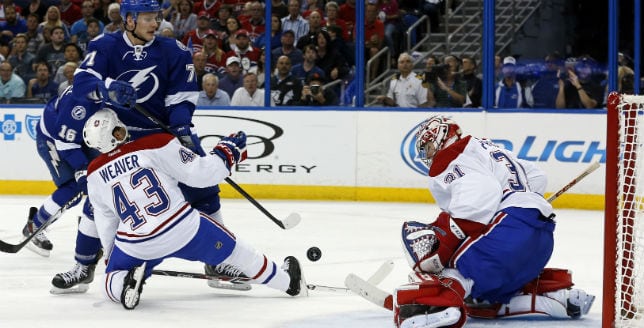
Carey Price and Marc-Andre Fleury didn't exactly overcome their checkered playoff pasts on the opening night of the post-season, but they both made the saves they needed to and came out with victories.
 Fleury, Price just good enough to win Game 1
Fleury, Price just good enough to win Game 1Let’s get one thing out of the way right away. If the four teams in the Eastern Conference play throughout the playoffs the way they did on the first night of the post-season, none of them will be around beyond the second round.
It was a night where all the playoff rules were broken, but also one in a couple of hockey’s age-old axioms held true. The notion that defense and goaltending rule in the playoffs went out the window very early in both the Montreal Canadiens 5-4 overtime win over Tampa Bay and the Pittsburgh Penguins 4-3 win over the Columbus Blue Jackets. The age-old theory that scoring dries up in the playoffs also made a hasty retreat.
But, hey, it’s the Eastern Conference. If you’re looking for masterpiece games from a defensive standpoint, take your complaints to Dave King. If you seek actual entertainment, intensity and some pretty damn compelling hockey, don’t take your eyeballs off the screen for a second.
Playoff Conventional Belief No. 1 that held is your success in the playoffs is directly connected to how your depth players perform. In Pittsburgh, Sidney Crosby was minus-2 and was on the verge of snapping over all the attention Brandon Dubinsky was paying him. But Brandon Sutter, who scored the game winner and provided a great screen on another power play goal, might have been the best player on the ice, followed closely by linemate Beau Bennett.
In Tampa, the Canadiens got outstanding play from their bottom six forwards, capped by Dale Weise’s overtime goal in the dying minutes of the first overtime period. What exactly, you might ask, was Montreal’s fourth line doing out there in overtime? Should Weise, Daniel Briere and Michael Bournival not had their hockey pants nailed to the bench? You might think so, but that would dismiss the fact that Briere is one of the best clutch players of his generation. No surprise it was his pass from behind the net that led to Weise’s goal. The Canadiens third line of Lars Eller between Rene Bourque and Brandon Prust was just as good.
But the playoff axiom that held most true on the night was that your goaltender doesn’t have to necessarily steal games for you, but he can’t lose them. On that front, both Marc-Andre Fleury of the Penguins and Carey Price of the Canadiens delivered. And given both their checkered playoff histories, that must indeed provide a healthy amount of relief for fans of both teams.
Were Fleury and Price good? No, not particularly. Will they have to be much better if their teams hope to have long playoff runs? No question. But despite not playing well, they both found ways to make the stops at crucial times – Fleury late in the game when the Blue Jackets were pressing and Price in overtime when the Lighting took nine of their 25 shots.
Fleury’s playoff career can be delineated by two distinct phases – the successive seasons the Pittsburgh Penguins went to the Stanley Cup final and all the others. And the difference in those two time periods is astounding. In 2008, when the Penguins lost in six games to the Detroit Red Wings in the final, and 2009, when the Penguins prevailed over the Red Wings in seven games, Fleury compiled a record of 30-14 with a 2.09 goals-against average and .920 save percentage.
In the other five playoffs in which Fleury has played, he has a 15-20 record, 3.26 GAA and .880 save percentage. Fleury’s reputation for being either brilliant or brutal in the post-season was cemented last spring when Fleury watched Game 5 of the first round and the rest of the Penguins playoff run while Tomas Vokoun took his job.
Price wasn’t much better last year before getting injured in the first round against the Ottawa Senators, but he has rebounded in a big way, putting himself in the Vezina Trophy conversation and being full marks for earning the No. 1 job for Canada at the Sochi Olympics.
There’s no doubt Price and Fleury have to be better than they were in their respective Game 1s. But if their teams take advantage of their opponents’ mistakes and score the way they did on opening night, at least they don’t have to be perfect.

